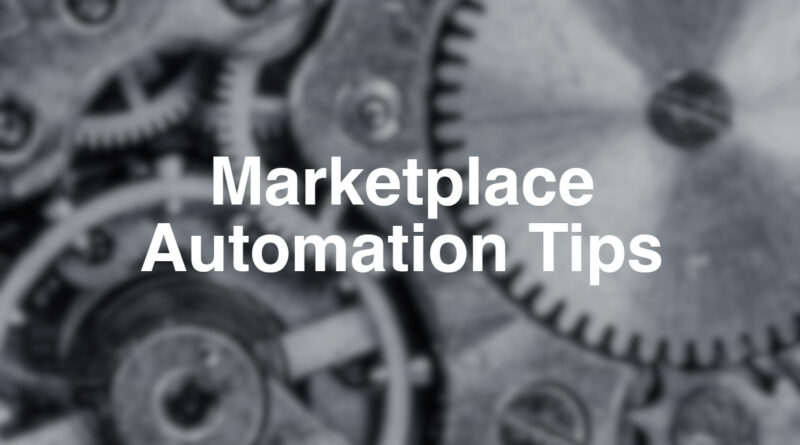6 Workflow Automation Ideas for eCommerce Marketplace
The COVID-19 pandemic strengthened the idea of digitization all over the world. Many traditional offline retail stores started investing in taking their business online to attract more customers and boost their sales.
However, setting up an online store is simply not enough. There are many responsibilities that a business needs to manage to streamline its eCommerce operations. This requires hiring an additional workforce and having a continuous cash flow. But, not all companies have the required investment capital. That’s where smart technology and workflow automation take over repetitive eCommerce operations.
For example, every eCommerce business needs to implement innovative strategies to reach out to its customers. Hence, leveraging various automation software, such as email marketing software, social media scheduler, or an integrated eCommerce marketplace solution can take away the hassles of manual processes allowing the team to focus on other essential business activities.
Similarly, managing financial documents, such as taxes claims, sales quotes, investments, invoices, and more can be a time-consuming process. Businesses can invest in smart accounting software, such as Freshbooks, and sales tools like Hubspot CPQ to simplify these processes and save time.
In this article, we will understand various automation tactics eCommerce marketplaces offer for streamlined operations.
1. Order Processing and Management
Order processing and management are among other crucial tasks for eCommerce marketplaces.
Every business receives numerous orders from various platforms, such as websites, social media, or any other sales channel. Hence, having a centralized platform to manage these orders is essential to deliver a good experience to the customers. Relying on customizable marketplace platforms helps businesses to manage and fulfill orders without any delays.
The eCommerce marketplaces leverage automation to carry out complex yet mundane tasks without any hassles. Sellers can manage their orders seamlessly on a centralized dashboard and receive real-time notifications every time a new order is placed. Further, the intelligent marketplace solution routes the order to the best fulfillment location based on the inventory and the customer’s delivery address.
Automated order processing verifies and processes the orders as they are placed and also, notifies the customers about the order status. This will help reduce human errors and speed up the order shipping process.
In the case of order returns or replacements, the system will automatically verify the return requests and initiate a return or refund based on the inputs of the customers.
2. Inventory Management
Automated inventory management helps eCommerce sellers to organize and track stock and supplies in real-time.
eCommerce marketplaces offer automated inventory control and other features that help sellers optimize their entire inventory process.
- Multichannel inventory tasks – Track the inventory levels across all sales channels as they make new sales, ship product exchanges, or process product returns. Display the product’s inventory count on the product details page to the shoppers automatically for influencing their purchases.
- Stock reordering – Set up a workflow to notify the seller whenever a product reaches a minimum value in the inventory database. Sellers can also configure the system to release purchase orders for the products running low on stock on their behalf.
- Inventory forecasting – Know which products are the best-selling ones or the ones that are underselling. Use this information to generate demand forecasting reports for better inventory planning and share the same with the sellers. This will help in avoiding excess inventory and stock-out situations.
3. Shipping Labels and Invoices
Creating invoices and shipping labels manually or using third-party software can be a challenging and time-consuming process. Copying and pasting customer details from one system to another can result in errors in the customer or shipping information. Hence, sellers look for an eCommerce marketplace that offers automated tools for invoice and shipping label generation that will speed up these processes.
The intuitive labeling solution in the marketplace software prints shipping labels and invoices simultaneously at the time of order packing. It speeds up the order packing process by extracting customer data and billing information from the order details automatically. This ensures the right labels and invoices are placed on the packages.
Sellers can set up smart rules in the system that determines the right type of shipping carrier depending on the contents of the shipments. For example, a customer wanting an express delivery of products has already paid a little extra for the shipment. Based on the order details, the system identifies the shipping partner and auto-assigns them to the order before printing the labels.
Further, the system also shares the order invoices including the shipment tracking details with the customers over their respective emails without any manual intervention.
4. Automation in Payment Distribution
Payments are one of the challenges that eCommerce sellers face that affect the overall budget and profit margins. Hence, sellers wish to invest in an intelligent marketplace solution that streamlines the entire payment distribution process and facilitates hassle-free payment transactions.
Marketplace software, such as CS-Cart Multi-Vendor is integrated with over 70+ popular third-party payment gateways and offers the best solutions to accept payments. Being compliant with PCI and other security standards, the marketplace helps businesses avoid any legal complications and receive payments over a secured network. It supports multiple currencies and payment options, such as debit and credit cards, gift certificates, and more to collect payments.
Payment automation streamlines the entire payment workflow and enables sellers to get paid faster. Sending payments to the sellers can be automated as per their payment schedules. This will reduce the occurrences of sending incorrect amounts, late payments, and other payment-related issues.
Automating the payment process also helps marketplaces to have a fraud-filtering mechanism for authenticating the payments, thereby reducing the fraud risks.
5. Promotional Ad Space
Hundreds of sellers are selling similar products across various eCommerce websites giving rise to stiff competition for gaining customers’ attention. Digital advertising or promotional ads on these websites offer the best chances to sellers who wish to increase their visibility and boost sales.
The eCommerce marketplaces can leverage its robust automation engine to offer sellers the flexibility to optimize and scale ad campaigns and reach out to a larger audience. When setting up sponsored ads on the marketplace, you can provide them with an automated tool to manage the bidding, update the ad content, and more. Sellers can also configure some automation rules to optimize the bidding costs for a greater return on ad spend.
You can design personalized ad campaign suggestions for the sellers by monitoring shopping trends, choosing the right target audience, planning the best keyword strategy, and optimizing the ad copy. Let them manage the promotional content from a centralized platform i.e. your marketplace solution.
6. Report Generation
Monitoring sales and team performance are essential for eCommerce success. Marketplaces must carefully examine each aspect of the eCommerce processes, such as sales, inventory, sellers, customers, products, and more, and make thoughtful decisions.
Reports help eCommerce marketplaces to identify the potential of the store data to scale their ventures. The eCommerce marketplace management systems provide extensive reporting features that conduct a deep analysis of customer data, purchase history, and more to generate intuitive sales reports in graphical or tabular formats.
The introduction of automation in reporting has further simplified the report-generation process. You do not have to spend time on copy-pasting data anymore as the reports can be generated in just a few clicks. The system can also be configured to create reports automatically and share the same with the concerned team without any manual intervention. You can also schedule the report deliveries to save time.
Wrapping Up
By leveraging workflow automation, eCommerce marketplaces can streamline and transform business operations. This will reduce human errors, eliminate process bottlenecks, and provide ample opportunities for business growth. Automate the processes of your eCommerce marketplace today and scale your business.

Lucy Manole is a creative content writer and strategist at Marketing Digest. She specializes in writing about digital marketing, technology, entrepreneurship, and education. When she is not writing or editing, she spends time reading books, cooking and traveling.
Header image by Pavlo from Pixabay
Yan Anderson is the Head of Content Marketing at CS-Cart with over 10 years of experience in the eCommerce industry. He's passionate about explaining complicated things in simple terms. Yan has expertise in building, running and growing eCommerce marketplaces. He loves to educate people about best practices, new technologies, and trends in the global eCommerce industry.

